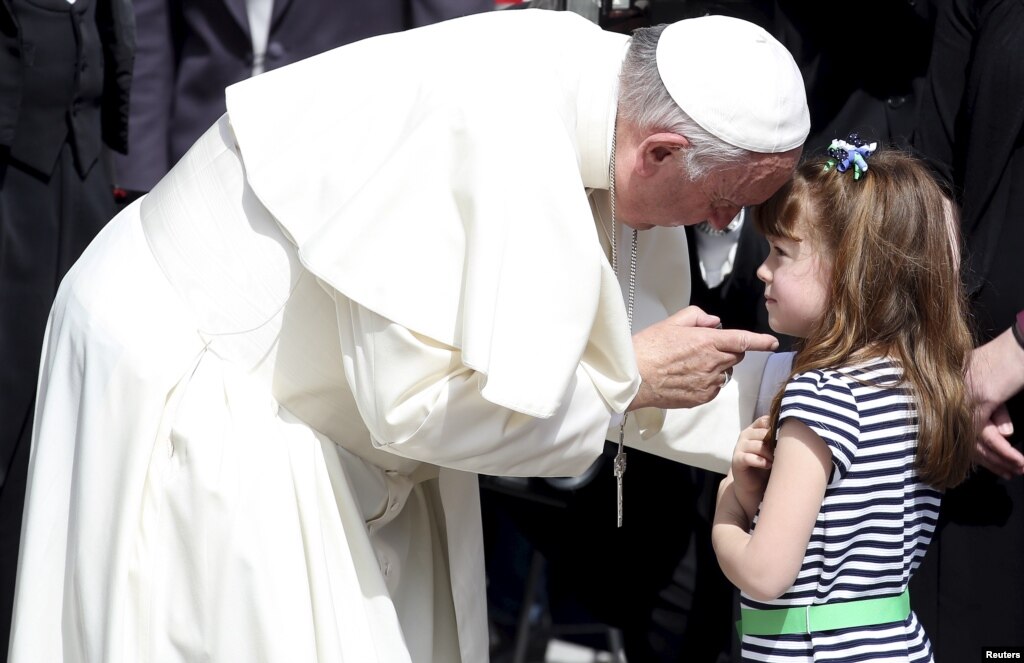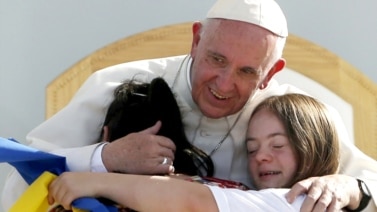
Pope Francis’ call for a more welcoming Catholic Church is similar with the views of many American Catholics.
Last year, the Pew Research Center questioned Catholics and found support for changes offered in the Pope’s letter “The Joy of Love.” Many Catholic Americans wanted him to take more steps, according to the report.
In his message to the Catholic Church’s 1.2 billion members, Francis called on clergy to accept people who were divorced and remarried as well as unmarried people living together in a romantic relationship.
He said people who already have children may use their own consciences “to limit the number of their children.” That was seen as a change – at least in tone – from the church’s ban on artificial birth control.
But he continued the church’s opposition to abortion and same-sex marriage.
Thomas Groome is a professor of theology at Boston College in Massachusetts. He said the pope did not change basic church positions on marriage and family, but rather called for more understanding of people who have different views.
“Pope Francis says we have been called to form consciences, not to replace them,” Groome said. “In other words, the church can’t take over people’s consciences. They have their own conscience and that has to be respected.”
Deborah Rose-Milavec is executive director of FutureChurch. The organization has been calling for “a more welcoming” Catholic Church.
Rose-Milavec sees the pope’s message as critical of Catholic bishops who are “building walls” to keep out “sinners.” Still, she said the pope’s message needs more “development.”
Marianne Duddy-Burke is executive director of DignityUSA, a Catholic group that supports gay and lesbian rights. She is disappointed the pope said same-sex marriage is not part of “God’s plan for marriage and family.” She said, “We had hoped for much more,”
Details of the Pew study
The Pew Research Study studied the views of U.S. Catholics last year. It found three out of four Catholics believe the church should allow couples to use birth control.
Pew said 84 percent of American Catholics believe it is acceptable for unmarried parents who live together to bring up children.
Six-in-ten say the church should allow divorced and remarried Catholics without an annulment to attend religious service, known as a mass. An annulment is a ruling by a Catholic court that a marriage was never really valid.
The pope said in his message that Catholic clergy should not stop people who are divorced or in other “irregular situations” from attending mass. If they show love for each other, and take care of their children, divorced couples should be allowed to marry in the church, Pope Francis said.
Pew said nearly half of American Catholics believe the church should recognize the marriages of same-sex couples. The pope rejected that view, though he repeated his call to treat gays with respect and without discrimination.
Six in 10 say they agree with Catholic Church policy – repeated by Francis – that abortion is a sin, according to the Pew survey.
But only three in 10 consider opposition to abortion an important part of being a Catholic. That view differs from the three U.S. Republican presidential candidates. They all promise new efforts to ban, or at least limit abortion.
Bruce Alpert reported on this story for VOA Learning English. Hai Do was the editor.
We want to hear from you. Write to us in the Comments Section or share your views on our Facebook Page.
Words in This Story
divorced – adj. someone who has ended a marriage through a legal process
romantic – adj. relating to love between two people
conscience – n. the part of the mind that makes you aware of your actions as being either morally right or wrong
artificial birth control – n. pills or other devices that keep a woman from getting pregnant
abortion – n. a procedure to end a pregnancy
sin – n. act of wrongdoing according to religious or moral law
disappoint – v. to make someone unhappy
irregular – adj. not normal, or usual
survey – n. an activity in which many people are asked a question or a series of questions in order to gather information about what most people do or think about something


